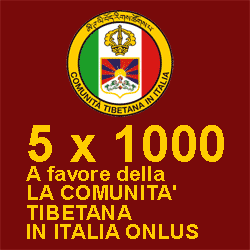Benvenuti nel nostro sito
La Comunità Tibetana in Italia è un’associazione onlus senza scopo di lucro composta dai Tibetani residenti sparsi in Italia, è dedita a preservare e promuovere la ricca identità culturale tibetana e a far conoscere in Italia la grave situazione politica del Tibet. Svolge inoltre la funzione di riferimento per i Tibetani residenti in Italia. |
| Obama presses Hu Jintao on Human Rights |
|
Source: phaytul.com 19, Jan, 2011 WASHINGTON - U.S. President Barack Obama pressed President Hu Jintao to give China's 1.3 billion people more freedom, stepping up the forcefulness of his message on a contentious issue between the two countries. Obama won an acknowledgment from Hu that China needs to do more but the Chinese leader also made clear at a joint news conference Wednesday that any dialogue on the subject must avoid interference in his nation's affairs. "As I've said before and I repeated to President Hu, we have some core views as Americans about the universality of certain rights -- freedom of speech, freedom of religion, freedom of assembly -- that we think are very important and that transcend cultures," Obama said.
"I have been very candid with President Hu about these issues." Asked by a reporter about human rights, Hu at first did not respond. But when a second reporter followed up, Hu blamed translation and technical problems for his initial silence. "China is always committed to the protection and promotion of human rights," he said. But Hu also said that "a lot still needs to be done" and that Beijing is willing to have a dialogue on the issue on the basis of mutual respect and noninterference in China's internal affairs. A White House official said the first question on human rights had been translated for Hu, as were other questions. Obama has faced accusations at home of giving short shrift to human rights concerns in his policies toward China, Russia and other countries. He was heavily criticized for not pushing Hu harder on human rights during a 2009 visit to China. Hu's participation in the news conference was itself a victory for the White House. Hu rarely takes questions from reporters and Obama's aides had pressed hard to have the session with media included in Hu's four-day state visit. MEASURED WORDS While Obama was more direct on human rights than he has been with Hu in the past, he still measured his words. "I don't think anybody was expecting some sort of breakthrough on human rights from President Hu Jintao on his trip here," said Elizabeth Economy of the Council on Foreign Relations think tank. "Obama did a fine job of stating what the U.S. expectations are but doing it in a way that was not insulting." Obama did not speak publicly about specific cases such as jailed dissident Liu Xiaobo, who, like Obama, is a Nobel peace prize winner. On Tibet, Obama said the United States supports dialogue between China and representatives of exiled Tibetan spiritual leader the Dalai Lama, and wants Beijing to respect the religious rights of the Tibetan people. The U.S. president broached the rights issue early in the summit, alluding to it during a carefully choreographed arrival ceremony for Hu on the White House lawn. "History shows that societies are more harmonious, nations are more successful and the world is more just when the rights and responsibilities of all nations and all people are upheld, including the universal rights of every human being," he said. "Harmonious Society" is a key ideological slogan of Hu's government as it tries to maintain his Communist Party's grip on power in an increasingly free-market economy. Hu's U.S. visit has become a lightning rod for advocates of China's minority Uighurs, Tibetans, imprisoned democracy advocates and other disgruntled groups. Hundreds of people converged on Washington to protest. The activists, who say that rights conditions have worsened despite China's rapid economic growth, have pressed Obama to address their concerns both publicly and privately with Hu. As Hu was feted at the White House, lawmakers at a U.S. congressional hearing castigated China on human rights. Hu was denounced as "China's iron fist in Tibet" at the hearing of the House of Representatives Foreign Affairs Committee, which is controlled by Republicans, the opposition party to Obama's Democrats. One Republican, Representative Dana Rohrabacher, said Hu was from a "monstrous regime" that was repressing members of the Falun Gong spiritual sect, among others. No one rushed to Hu's defense. Some Democrats used a more measured tone, including Representative Howard Berman, who said China was "neither an ally nor an enemy." But he said China's human rights record "remains deplorable." Outside the White House, some 200 Tibetans and their American supporters staged a colorful protest in Lafayette Park, chanting "Who is a liar? Hu Jintao is a liar" and "Killer, killer, Hu Jintao." Two actors wearing towering skeleton costumes chased down others in a long Chinese dragon outfit in front of a banner that read, "Hu has Tibetan skeletons in his closet." Mary Beth Markey, head of the International Campaign for Tibet, praised Obama's remarks, saying: "I think it was a good day for human rights. ... He said exactly what we wanted him to say on Tibet." But Rebiya Kadeer, a leader of China's Muslim minority Uighurs, said she wished Obama had been more specific about Chinese repression of her people. "It's a disappointment that these important issues have not been raised by the administration during this important summit," she said. |
